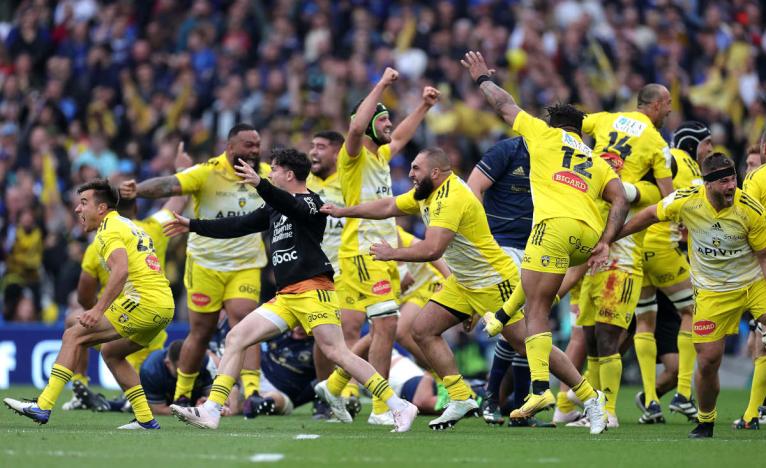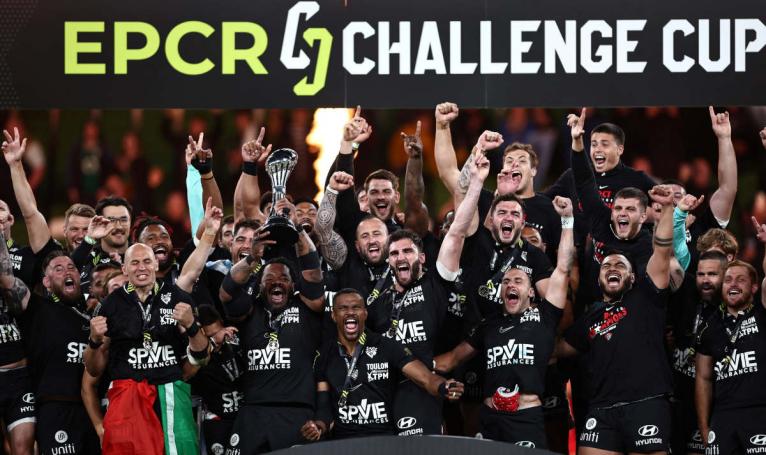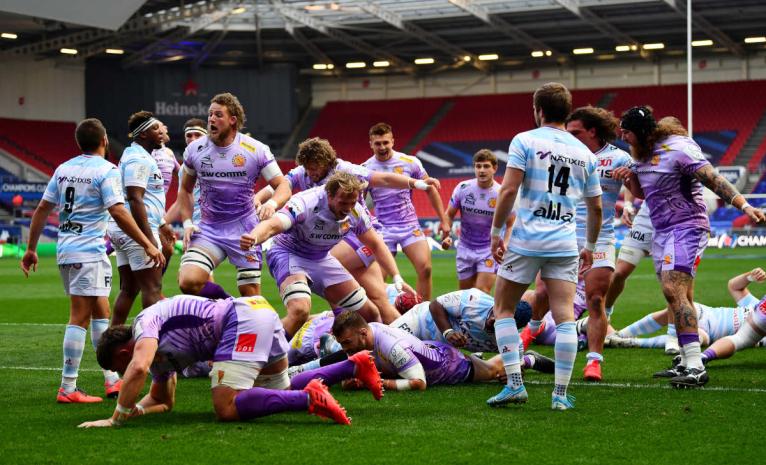Harry Kane has been keeping a close eye on the launch of European club rugby this season. Not literally, of course – he is off in Germany, apparently finding it a doddle to score goals across swathes of the Bundesliga. But when clubs gathered at Tottenham Hotspur Stadium to launch the Investec Champions Cup, a massive mural of the Spurs legend was impossible to miss.
Rugby is, currently at least, far from being in football’s league when it comes to commercial clout and global reach, and rugby doesn’t yet have a Kane-like poster-boy. But the Champions Cup and European Challenge Cup finals will both be played at the Tottenham Hotspur Stadium in May in a move that speaks of the ambition that the competition organisers, European Professional Club Rugby, are seeking to inject into the tournament.
And while Kane’s new country of residence may not yet be on the European club fixture list, there are clear signs of expansionism. Tbilisi-based Black Lion will be the first Georgian club to play in the Challenge Cup this campaign while South African side the Cheetahs will be based out of Amsterdam.
All of which brings us to the slightly loaded question of the fixture list and format for 2023-24. Arguably, the Champions Cup’s configuration over the past couple of seasons has been as labyrinthine as the Amsterdam canal network. But things are being simplified this year, with a return to something more like the traditional group stage.
In the words of Dominic McKay, chairman of European Professional Club Rugby, the tournament’s 29th edition is going “back to the pools”.
“Rugby needs to be better at telling its story,” he says. “Part of that is how competitions works and how you can watch them. Chopping and changing is not something we’re interested in.
“We tinkered with the tournament a few years ago and it wasn’t to its advantage. I’m very impressed with the progress of the last 18 months and we’re aggressively ambitious about where we can take this tournament.

“Rugby is still a challenger sport in some respects and we need to work to make it a dominant sport.”
There is a certain irony in this being said in Spurs’ cavernous, state-of-the-art stadium, as journalists recline in the media room’s plush leather seats. If rugby is the challenger, football is the dominator. And as McKay spoke from the front of the room, he was clearly focused on European club rugby capturing some of football’s lustre and financial wherewithal. A simplified initial stage of the tournament is part of that approach.
This year in the Champions Cup, 24 clubs have been drawn into four pools of six. Within those pools, clubs from the same domestic league won’t play one another. Each team will play four matches against four different opponents – two at home and two away. The four highest-ranked clubs from each pool will qualify for the Round of 16. Standard knock-out rugby will then kick in.
McKay is honest that more recent editions of the tournament have not inspired the kind of interest or emotion that it enjoyed in its heyday. The impact of covid was partly to blame for that, but in a post-pandemic sporting landscape he is confident the tournament can quickly find its feet again. He cites the quality of last year’s final, and also a conference hosted by EPCR in Toulouse last month that brought together 42 clubs from across eight unions and three leagues.
Rugby is getting its act together and professionalising itself. People aren’t seeing each other as adversaries. The only time we should be competing is on the field. We have perhaps been humbled a bit by the impact that covid had.
“There is a growing affection for the tournament which had perhaps dissipated a few years ago,” he says. “With the tournament’s knockout rugby, the quality of the rugby is test match level plus.
“The South African sides have really added something to the competition. The quality of the play and the experiences that the Northern Hemisphere players have had down there has been very positive.
“Rugby has not always been great at working collaboratively and we’re getting better at that now. We’re working very hard together to drive the sport forward for the benefit of the players and supporters.
“Rugby is getting its act together and professionalising itself. People aren’t seeing each other as adversaries. The only time we should be competing is on the field. We should be coming together to help us settle into new markets. We have perhaps been humbled a bit by the impact that covid had.”

As rugby attempts to sell itself, the air is peppered by talk of “markets” and “strategy”. A press release announcing a three-year partnership with the Georgian tourism sector to promote the country as a destination talks of “commercial momentum”.
It would be easy to raise an eyebrow. Do holidays to Tbilisi and European rugby really mix? But rugby needs to grow beyond its traditional heartlands and hinterlands, and goodness’ knows that the club game – certainly in England – needs additional revenue streams and creative thinking.
All this talk of expansion and new markets has got some players excited, too. “How about Greece and South America as well?” jokes Stormers utility forward Ben-Jason Dixon when pondering the competition’s next foray.
Dixon welcomes innovations such as having the Cheetahs based in Amsterdam. “We want to market rugby so if we can have these things happen then it broadens the rugby landscape,” he points out.
South African influence and presence in the tournament is growing. The new title sponsor is South Africa-based finance firm Investec. Indeed, three-quarters of the World Cup-winning Springboks squad will play in European club competitions this year. And in addition to the competition’s established South African sides another one – the Durban-based Sharks – will be appearing for the first time in the Challenge Cup.
EPCR chief executive Jacques Raynaud, a former TV boss, sees commercial growth and geographic expansion going hand in hand, but of course that does not mean that established strongholds should be neglected. Nor should the burgeoning women’s game be overlooked. McKay says the organisation is “in the foothills” of a project to start a women’s Champions Cup.
But enough of markets and moolah. What of this season’s rugby?
The principal question is whether Gallic dominance can be interrupted. Both tournaments have been won by French sides for the past three seasons. La Rochelle

edged past Leinster in the last two editions of the Champions Cup, with captain Grégory Alldritt Player of the Year last campaign, and in 2021 it was Toulouse who triumphed. The last three Challenge Cups have all gone south of the Channel too, with Toulon winning most recently and Lyon (2022) and Montpellier (2021) prior to that.
Intriguingly, La Rochelle and Leinster are both in the same group – Pool 4 – and will resume their close relationship on Sunday at the Stade Marcel Deflandre. La Rochelle’s Raymond Rhule makes no bones about his side wanting to carve a piece of hat-trick history, and says they’re ready for all-comers. “We’re trying to create our own history and legacy but we know everybody is essentially coming for our heads,” he says. “But we take that as a sign of respect, to be honest. Toulouse would be a side we as a group would like to beat because they have robbed us of a couple of trophies. But we just want to be in that final and whoever we play would be the cherry on top.”
The tournament kicks off on Friday with Glasgow hosting Northampton and Bordeaux-Bègles travelling to Connacht. And in the opening weekend of the Challenge Cup, Gloucester’s trip to Tbilisi on Saturday stands out as a step into the unknown – and a potential slip on a banana skin.
Owen Farrell is someone who knows all about the drama of Champions Cup fixtures, both as spectator and player. Sporting a vivid red Saracens hoodie, he sticks out at the launch amid the journalists’ muted winter colours, and is chatty when asked about what fires him up about European club rugby.
“As a kid, I would sit there in front of the TV on a Friday night, all day Saturday and all day Sunday,” he recalls. “I wouldn’t move there were so many big games on. There is something about European games, both for the players and the crowds. The atmosphere changes a bit. I can’t quite put my finger on it but there are some European nights which just stand out.”
Farrell refers to La Rochelle as the “standard bearers” and admits they are the ones to target. But to begin with, he’s just trying to comprehend the idea of chucking the ball around in the summer sunshine in Pretoria on Saturday when Saracens begin their campaign against the Bulls. “The thing I’m trying to get my head around is how we play in the sun in December!”
His television duties done, the genial Exeter captain Jack Yeandle ambles towards me. Can the Chiefs get back on the European horse and end recent Franco-Irish domination by reaching a final? “It would be nice to see an English team in the final – it’s all about completing the first couple of games well, getting the ball rolling and building some momentum,” he says, very business-like. Although that could be a seriously tricky prospect with the Chiefs travelling to Toulon for their opener on Saturday, and then hosting Munster the week after.

“It’s the small details on the pitch that make a big difference. It’s not about one person breaking 40 tackles that wins a game for you, it’s doing the simple things over and over again.”
The Chiefs are a much-changed, younger side to the one that lifted the Champions Cup in 2020, with Yeandle one of the few remaining older guard. But he sees that as a positive, with a certainje ne sais quoi freshness to training.
“Exeter is a really good environment to be in at the moment, and I’ve been through a few,” he says. “It’s really positive. There are no negative sessions – it’s all bouncy and excitable. It’s a brilliant thing to have. We’ve been on the wrong end of a couple of results recently but we’re still bouncing. That’s a good foundation for success.”
Bouncing squads and an excitable rugby public. What would work for Exeter would work for EPCR as a whole, too. With the right bounce and excitement, maybe even Harry Kane will tune in this weekend.



Well maybe if they had a better kit designer we’ll take them seriously